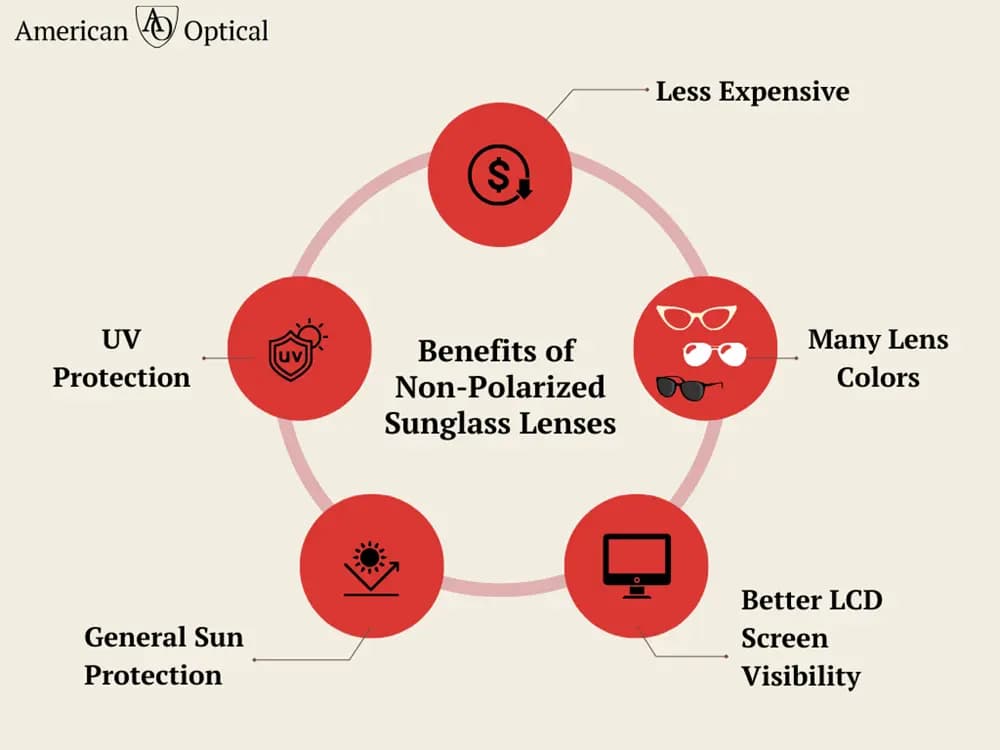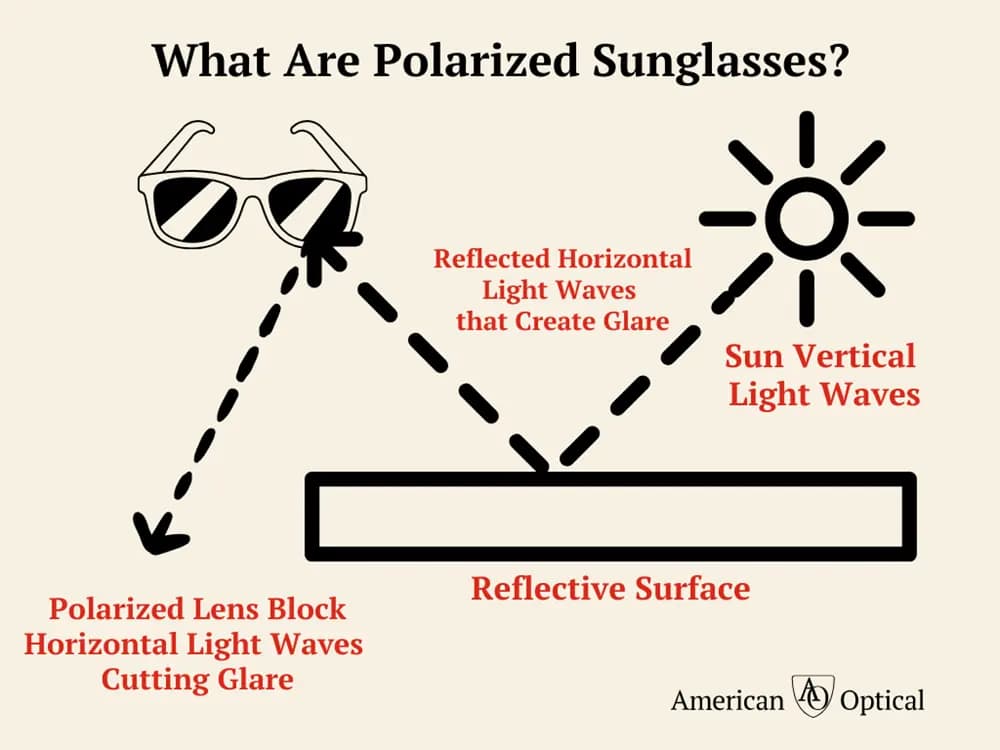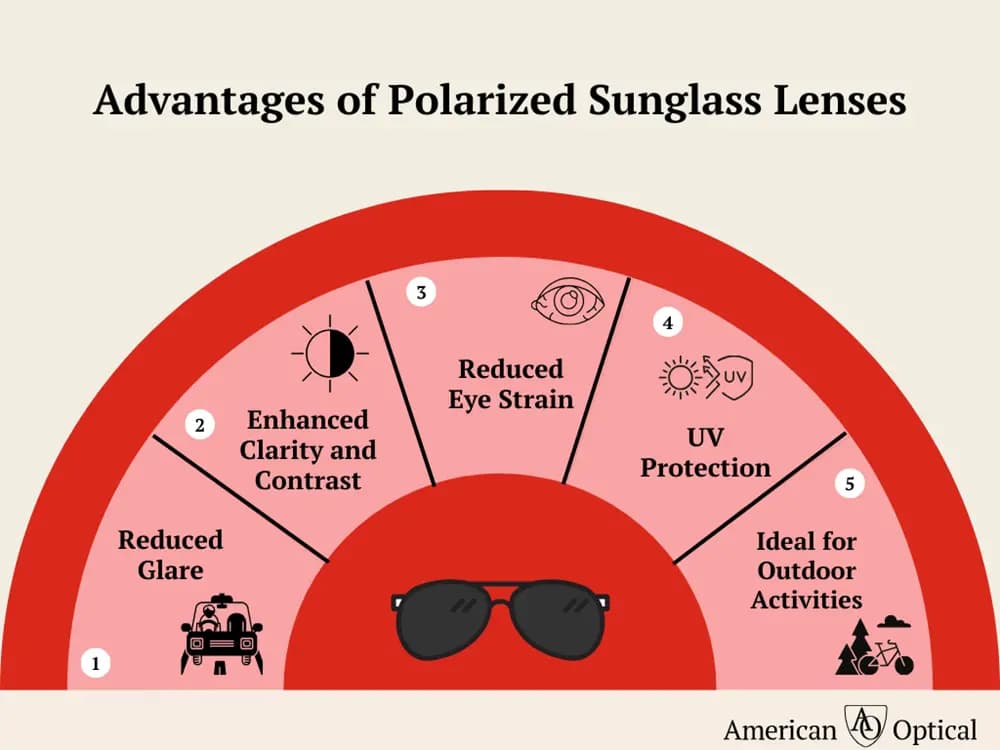
Polarized vs. Non-Polarized Sunglasses: Which Is Better for You?
What Are Non-Polarized Sunglasses?

Non-polarized sunglasses are traditional sunglasses that reduce the overall intensity of sunlight but don’t specifically target glare. These lenses don’t have the special coating that polarized lenses do, so they treat all light equally. This means that they reduce brightness but do not selectively filter horizontal light.
Benefits of Non-Polarized Sunglass Lenses
Non-polarized sunglasses, while simpler in design than their polarized counterparts, offer many benefits that make them a practical choice for many.

1. General Sun Protection
Non-polarized lenses offer basic protection from sunlight, which is essential for daily comfort and eye health. They filter out bright light and reduce the harshness and intensity of sunlight. This feature helps prevent squinting and eliminates discomfort when conditions are moderately bright.
2. UV Protection
Many non-polarized sunglasses also come with UV protection, though each product is different. You can be sure that all non-polarized American Optical sunglasses feature 100% UV protection. This UV protection helps shield your eyes from ultraviolet rays, reducing the risk of long-term UV damage such as cataracts and macular degeneration.
3. Less Expensive
Generally, non-polarized lenses are less expensive than polarized options. This makes them a more economical choice, especially for those who need multiple pairs or are prone to losing their sunglasses. They offer a budget-friendly way to protect your eyes and enhance vision in bright conditions.
4. Lens Color Options

Non-polarized sunglasses are versatile and ideal for a wide range of light conditions. They can be worn in various settings, from driving to casual outdoor activities, providing a balance of protection and visibility without the specialized glare reduction of polarized lenses. You may find more lens color options in non-polarized lenses that suit your personal style.
5. Better LCD Screen Visibility
One of the standout advantages of non-polarized lenses is their compatibility with digital displays. They allow easier visibility of LCD screens, such as smartphones, tablets, and car dashboards. This feature is critical for pilots and particularly beneficial for those who frequently use digital devices outdoors or in brightly lit environments.
Drawbacks of Non-Polarized Sunglasses
While non-polarized sunglasses are practical, they have limitations, especially in certain environments:
- Less effective in reducing glare: Not as efficient in handling reflections from surfaces like water or snow.
- Reduced clarity in bright light: They may not provide the same level of clarity and contrast as polarized lenses in very bright conditions.
- Potential for increased eye strain: In environments with a lot of reflective glare, non-polarized lenses do not reduce eye strain as effectively.
What Are Polarized Sunglasses?

Polarized sunglasses stand out due to their unique ability to reduce glare from flat surfaces. These sunglasses work by filtering horizontal light waves, thanks to a special chemical filter applied to the lens. This polarization helps significantly reduce glare from reflective surfaces like water or flat roads to help enhance clarity and reduce eye strain. Polarized lenses are especially effective in bright light conditions where sunlight reflects off horizontal surfaces.
Advantages of Polarized Sunglass Lenses
The benefits of wearing polarized lenses are significant, especially for those who spend a lot of time in bright environments.

1. Reduced Glare
Polarized lenses are exceptionally effective at reducing glare from reflective surfaces such as water, snow, and even the road. This makes them especially beneficial for driving, water sports, and winter activities where glare can be a major distraction and safety hazard.
2. Enhanced Clarity and Contrast
These lenses enhance visual clarity and contrast in bright conditions. Polarized lenses allow for crisper, clearer vision with improved detail and depth perception by filtering out horizontal light rays. This feature is especially helpful in outdoor settings where clearly seeing objects and terrain is important.
3. Reduced Eye Strain
Wearing polarized lenses can significantly minimize eye strain. In bright conditions, the eyes may struggle to cope with glare and reflections, leading to discomfort and fatigue. Polarized lenses help by reducing this strain, allowing for more comfortable vision over extended periods.
4. UV Protection
Many polarized lenses, like those in American Optical polarized sunglasses, provide UV protection, which is vital for protecting your eyes against harmful ultraviolet rays. This protection can maintain long-term eye health, as UV rays can contribute to various eye problems, including cataracts and macular degeneration.
5. Better Vision for Outdoor Activities
Sunglasses with polarized lenses are particularly ideal for activities such as boating, fishing, skiing, or any outdoor activity where reflected light is a major concern. The reduction in glare and enhanced visual clarity can improve performance and enjoyment in these activities, making polarized sunglasses the best choice for outdoor enthusiasts.
Disadvantages of Polarized Sunglasses
Even the best technology has its downsides. Here are some considerations to keep in mind with polarized lenses:
- Difficulty viewing LCD screens: This can make it hard to view computer screens, smartphones, and other LED screens. This is particularly important for pilots who need a clear vision of their control panels.
- Low light conditions: Polarization is not as necessary in low light or indoor settings.
- Cost: Typically more expensive than non-polarized glasses due to the specialized technology involved.
Choosing Between Polarized and Non-Polarized Lenses: Key Considerations
Choosing between polarized and non-polarized sunglasses depends on your specific needs and activities. If you spend a lot of time outdoors, especially near water, snow, or other reflective surfaces, polarized sunglasses offer significant benefits. However, if you frequently use digital screens, non-polarized glasses might be better. Always consider UV protection as a crucial factor in any sunglasses you choose. Consult an eye doctor for personalized advice, especially if you have specific concerns about UV damage or eye health.
This table provides a quick overview to help you decide which type of sunglasses is better for you:
| Factor | Polarized Sunglasses | Non-Polarized Sunglasses |
|---|---|---|
| Glare Reduction | Excellent at reducing glare from reflective surfaces. | Less effective in reducing glare. |
| Clarity & Contrast | Enhanced clarity and contrast in bright conditions. | Comparatively lower clarity and contrast. |
| Eye Strain | Reduced eye strain in harsh light conditions. | Potential for eye strain. |
| LCD Screen Visibility | Can make viewing LCD screens difficult. | Better visibility for digital displays. |
| Cost | Typically more expensive. | Generally less expensive. |
| Ideal Use | Best for water activities, and outdoor sports. | Suitable for general use, and everyday wear. |
| UV Protection | Often offer UV protection. | Usually offer UV protection. |
Find Your Perfect Pair of Polarized or Non-Polarized Sunglasses with AO Eyewear!
![]()
The choice between polarized and non-polarized sunglasses really depends on your individual needs and lifestyle. While polarized lenses offer better glare reduction for specific activities, non-polarized lenses are great for everyday use. The key is to select a pair that provides comfort and eye protection and suits your daily routine. Remember, the priority should always be eye health and protection.
For a variety of both polarized and non-polarized options that blend style with function, check out the sunglasses selection at AO Eyewear. Find your perfect pair today!
10% off your first purchase
Join our email list to be first to hear about new arrivals, limited-edition drops, sales, and more! Exclusions apply.







